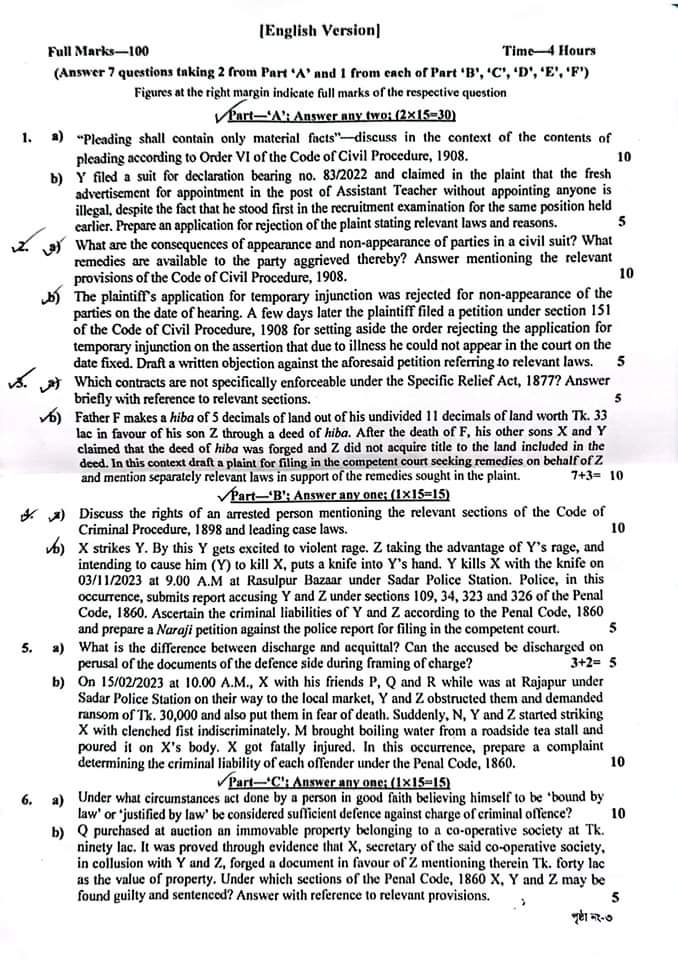Application of Legitimate Expectation in Bangladesh
Introduction:
Legitimate expectation is a doctrine of public law developed by English Court. It is based on the broader concept of natural justice and requires the procedural fairness in administrative decision making so that the abuse of power can be prevented.
The term 'Legitimate Expectation' was first used by Lord Denning in 1969 in the famous case Schmidt v. Secretary of State for Home Affairs. Lord Denning recognized natural justice and observed that "the stated doctrine can be applied an administrative body may, in a proper case, be bound to give a person who is affected by their decision an opportunity of making representations. It all depends on whether he has some right or interest, or, I would add, some legitimate expectation, of which would not be fair to deprive him without hearing what he has to say."
In Bangladesh the theory of legitimate expectation is regarded as a branch of administrative law. Legitimate expectation is a ground for filing a writ petition in the High Court Division under article 102 of the Constitution of Bangladesh to review an administrative act or decision. Thus, it gives the applicant sufficient locus standi for judicial review.
Meaning of Legitimate Expectation:
Legitimate expectation is a right which is arisen by express promise, decision or act of any administrative authority or private parties. In other words fair expectation or ‘Legitimate expectation’ refers to the person's expectation of that authority if it makes hope in his favor by a previous behavior or statement of the authority.
In the case of Asaf Khan and others v. The Court of Settlement, Dhaka and others [23BLD (HCD)7] Justice M. M. Ruhul Amin later Chief Justice of Bangladesh commented that
"Legitimate expectation is a concept of administrative law which means that an administrative authority cannot abuse its discretion by disregarding undertaking or statement of its intent."
A person may have legitimate expectation of being treated in certain way by an administrative authority even though he has no legal right to receive first treatment. Where an action of administrative authority adversely affects legal right of an individual, duty to act fairly and reasonably is implicit. Even in case where there is no legal right, he may still have legitimate expectation for receiving the treatment of fair play in a ction. Such expectation may arise either from promise or from practice which one can reasonably expect to implement such promise or to continue such practice.'
Again, in Md. Hafizul Islam v. Government of Bangladesh and others” [23BLD(HCD)153]
Justice Amirul Kabir Chowdhury further elaborated and broadened its definition.
“The concept of legitimate expectation is to some extent uncommon in our jurisprudence. The word' Legitimate' connotes lawfully begotten. An expectation to become legitimate therefore should not be sworn of lawful begetting. The concept of legitimate expectation cannot be given such wide interpretation so as to all owan wishful hope without lawful root.”
Example: "AG of Hong Kong vs. Ng Yuen: The Gov. declared that the illegal immigrants would be interviewed and allowed to have their case considered on merit before being expatriated. Ng Yuen was interviewed but was not allowed to explain his humanitarian ground. Privy Council held that legitimate expectation was violated."
However, a legitimate expectation arises because of a promise, representation, practice or policy made, adopted or announced by or on behalf of the government or a public authority. Legitimate expectation may arise both of substantive and procedural rights.
Substantive and Procedural Right: Legitimate expectation creates both substantive and procedural right. A procedural legitimate expectation arises on the presumption that a public authority has to follow a certain procedure before taking any decision whereas a substantive legitimate expectation arises when an authority makes any promise that an individual will receive any benefit.
Lord Diplock, in Council of Civil Service Union v. Minister for Civil Service, has explained the doctrine, both in procedural and substantive contexts.
Procedural: The procedural part of it relates to a representation that a hearing or other appropriate procedure will be afforded before any decision is made.
Substantive: The substantive part of the theory is that if a representation has been expressly made that a benefit of a substantive nature will be granted or if any person is already in receipt of any benefit, it will be continued and will not be substantially varied to the disadvantage of the recipient.
Legitimate Expectation in Bangladesh: As our legal system is influenced by the English Law, legitimate expectation being based upon natural justice is applicable in Bangladesh. Because, after the decision of Abdul Latif Mirza vs. Government of Bangladesh [31 DLR 1], the principle of natural justice is now a part of the law of the country. Again, article 27 of the Constitution of Bangladesh emphasizes on elimination of all kinds of arbitrariness and insists on fairness in all administrative dealings. However, the doctrine of legitimate expectation is recognized by the Supreme Court in a number of cases.
Notable Instances where the SC of Bangladesh recognized legitimate expectation:
In Managing Director, Dhaka WASA v. Superior Builders [51 DLR (AD) 56], the Appellate Division held that A contractor can legitimately expect that he will be treated fairly if a contract is executed for any work. If an authority raises any hope by its previous behavior or statement, it can be called a legitimate expectation. The contractor may apply for judicial review if it imposes additional liability on the contractor after concluding a contract with a government or local authority. In the judgement Justice Mustafa Kamal observed that:
“Basically, the principle is that, a writ petition cannot be founded merely on contract, but when a contract is concluded the contractor has a legitimate expectation that he will be dealt with fairly. The legitimate expectation doctrine directs the government or the authorities concerned to act in a lawful manner and without any mala-fide intention."
In Bangladesh Soya-Protein Project Lid Vs. Secretary, Ministry of Disaster Management and Relief & Others [6 BLC 681], the doctrine of valid expectation has been discussed in details. Khairul Haque, later the Chief Justice of Bangladesh, said that:
“If the situation so demands, the Court shall certainly strike down such orders in exercise of its powers of judicial review of executive actions. In case of their unreasonableness or intertness or even laches on their part for which some benefit is lost causing prejudice to the people at large or even to an individual, the Court may also direct the concerned authorities to exercise their functions fairly, reasonably and in accordance with law.”
In case of Bangladesh vs. Idrisur Rahman,[15 BLC (AD) (2010) 49], the plaintiffs contended that the appointment of an additional judge in the HCD under Article 98 is a gate-way to the cadre of a permanent judge so an additional judge at least has a legitimate expectation to be appointed as a permanent judge to the High Court Division. And….. Judges are required to be appointed as permanent judges of the High Court Division in accordance with Article 95 of the Constitution.
The decision given in the case of SSA Banglad Limited v. Engineer Mahmudul Islam and others [24 BLD (AD) 92], is considered to be helpful in understanding the meaning of the stated doctrine. Justice Mohammad Fazlul Karim later Chief Justice of Bangladesh explained the scope of legitimate expectation in the following words:
“The principle of legitimate expectation imposed upon the Government or the concerned Authorities a duty to act fairly and reasonably in dealing with the rights and / or interest of the people and in case of any breach thereof the Court should act upon in striking down any order in exercise of judicial review of executive action and in case or any unreasonableness or inertness or even latches in its part for which some or part of which benefit is lost causing prejudice to the people at large, the Court may direct the concerned to exercise its functions fairly, reasonably and in accordance with law and established principles.”
Conditions of Legitimate Expectation: While granting legitimate expectation, the Court has to consider the followings as essential conditions:
Legitimate expectation must not cause failure of justice because it is introduced to maintain fairness.
The plaintiff must be one of the persons to whom the statement was made or the practice applied.
It shall not override public interest.[North South Property Development Ltd. vs. Ministry of Land, 52 DLR 7]
The statement or practice must be sufficiently clear and unambiguous.
The statement or practice has to be binding in nature.
Conclusion: Though legitimate expectation is playing an important role in order to uphold natural justice', it has some limitations i. e., it has no application against statute, contractual relation and public policy. Therefore, it can be said that in spite of having some constraints, the doctrine of legitimate expectation is working as one of the guidelines in establishing justice.







Informative article... Really helpful for learners..